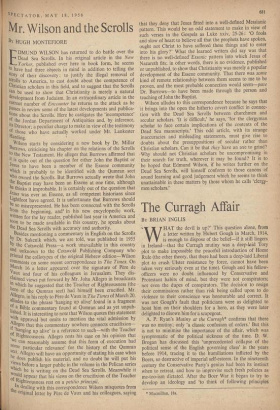Mr. Wilson and the Scrolls BY HUGH MONTEFIORE E DMUND WILSON
has returned to do battle over the Dead Sea Scrolls. In his original article in the New Yorker, published over here in book form, he seems to have had three objects in mind in addition to telling the story of their discovery : to justify the illegal removal of scrolls to America, to cast doubt about the competence of Christian scholars in this' field, and to suggest that the Scrolls can be used to show that Christianity is merely a natural development from Judaism. In an extraordinary article in the current number of Encounter he returns to the attack as he Passes in review some of the latest developments and publica- tions about the Scrolls. Here he castigates the 'incompetence' (), f the Jordan Department of Antiquities and, by inference, its Director; a peculiar charge to make in view of the testimony of those who have actually worked under Mr. Lankester Harding. • Wilson starts by considering a new book by Dr. Millar Burrows, criticising his chapter on the relations of the Scrolls !(3 the New Testament. He alleges that Burrows affirmed that It is quite out of the question for either John the Baptist or 'Jesus to have been a member of the Essene community Which is probably to be identified with the Qumran sect Who owned the Scrolls. But Burrows actually wrote that John !he Baptist may have been an Essene at one time, although ne thinks it improbable. It is certainly out of the question that Jesus was ever an Essene, as all competent historians since Lightfoot have agreed. It is unfortunate that Burrows should ,be so misrepresented. He has been connected with the Scrolls 'rum the beginning, and' in his new encyclopmdic work, written for the lay reader, published last year in America and suon to be made available in this country, be speaks about the Dead Sea Scrolls with accuracy and authority. Besides mentioning a commentary in English on the Scrolls LbY Dr. Sukenik which, we are told, was published in 1955 °Y the Cotswold Press—a work unavailable in this country dill unknown to the Cotswold Publishing Company who Printed the collotypes of the original Hebrew edition—Wilson c°111ruents on some recent correspondence in The Times. On _March 16 a letter .appeared over the signature of Pere de va.ux and four of his colleagues in Jerusalem. They dis- laimed views put forward by Mr. John Allegro in broadcasts lin which he suggested that the Teacher of Righteousness (the Ale,ro of the Qumran sect) had himself been crucified. Mr. mlegro, in his reply to Pere de Vaux in The Times of March 20, alludes to the phrase 'hanging up alive' found in a fragment Bible commentary found at Qumran and as yet unpub- "Shed. It is interesting to note that Wilson quotes this statement with approval. but omits to mention the vital admission by Af.11egro that this commentary nowhere connects crucifixion- ' , hanging up alive' is a reference to such—with the Teacher 31 Righteousness. Allegro rests his case on his opinion that we can reasonably assume that this form of execution had some particular relevance' for the history of the Qumran Fr. Allegro will have an opportunity of stating his case when . does publish his material, and no doubt he will put his view. s before a larger public in the volume in the Pelican series :hich he is writing on the Dead Sea Scrolls. Meanwhile it 3fould appear that his views on the crucifixion of the Teacher ,itighteousness rest on a petitio principii. „ In dealing with this correspondence Wilson misquotes from 'tie original letter by Pere de Vaux and his colleagues, saying that they deny that Jesus fitted into a well-defined Messianic pattern. This would be an odd statement to make in view of such verses in the Gospels as Luke xxiv, 25-26: '0 fools and slow of heart to believe all that the prophets have spoken, ought not Christ to have suffered these things and to enter into his glory?' What thd learned writers did say was that there is no well-defined'Essenic pattern into which Jesus of Nazareth fits; in other words, there is no evidence, published or unpublished, to show that Christianity was merely a popular development of the Essene community. That there was some kind of remote relationship between them seems to me to be proven, and the most probable connection would seem—pace Dr. Burrows—to have been made through the person and teaching of John the Baptist.
Wilson alludes to this correspondence because he says that it brings into the open the hitherto covert. Conflict in connec- tion with the Dead Sea Scrolls between churchmen and secular scholars. 'It is difficult,' he says, 'for the clergyman scholar to face certain implications of the contents of the Dead Sea manuscripts.' This odd article, with its strange inaccuracies and misleading statements, must give rise to doubts about, the presuppositions of secular rather than Christian scholars. Can it be that they have an axe to grind? Why should not Christian scholars be uncompromising in their search for truth, wherever it may be found? It is to be hoped that Edmund Wilson, if he writes further on the Dead Sea Scrolls, will himself conform to those canons of sound learning and good judgement which he seems to think unattainable in these matters by those whom he calls 'clergy- men scholars.'


































 Previous page
Previous page